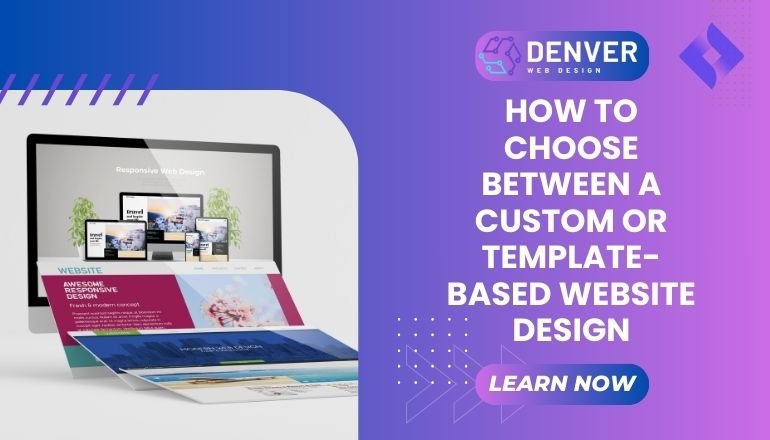
When it comes to building a website for your business, one of the first decisions you’ll face is whether to go with a custom web design or a template-based design. Each approach has its pros and cons, and the right choice depends on various factors such as budget, timeline, functionality, and brand identity. Whether you’re launching a responsive web design or an e-commerce website, making the right choice is essential for achieving a user-friendly experience that supports business goals.
At Web Design Denver, we specialize in guiding businesses through this decision-making process to ensure they choose the best design solution for their needs.
What is a Custom vs. Template-Based Website Design?
A custom web design is a fully tailored website built from scratch, specifically designed to meet the unique needs and branding of a business. The website is created using custom code, layouts, and functionality to ensure a unique user experience. This type of design often requires a larger investment of time and resources, but it offers greater flexibility and scalability in the long run.
On the other hand, a template-based design uses pre-designed website templates that are customizable but follow a predefined structure. These templates are usually faster and more affordable to implement, as they come with ready-made designs that can be easily modified with text, images, and branding elements. Template-based designs are often used by small businesses or individuals who need a website quickly and at a lower cost.
Why is Choosing the Right Website Design Essential for Your Website?
The decision between a custom or template-based website design impacts various aspects of your website, including:
- User Experience (UX): A custom web design offers a tailored user experience that aligns with your brand and specific goals. Customization allows for improved navigation, faster loading speeds, and features designed to boost conversion rate optimization (CRO). Conversely, a template-based design may limit your ability to fully optimize the user experience due to its generic structure.
- SEO and Performance: A custom-built website allows for SEO for websites to be integrated from the ground up, providing more control over how your site is optimized for search engines. Template-based websites may require additional customization to fully optimize for SEO, as pre-built templates often have non-ideal code that can affect search engine visibility.
- Scalability: A custom web design is typically more scalable, making it easier to add new features or grow your site as your business expands. Template-based websites, while easier to implement initially, may become restrictive as your business needs evolve.
- Brand Identity: Custom designs allow for full creative control, helping you build a unique brand identity online. Templates, while visually appealing, may lack the originality needed to distinguish your brand from competitors.
Key Features/Components of Custom and Template-Based Website Designs
When choosing between custom and template-based web design, consider the following key features:
- Unique Layout: Custom websites are designed specifically for your brand, ensuring a distinctive layout and functionality that’s tailored to your business goals.
- Full Customization: From typography to color schemes, and custom features, everything can be designed to match your brand’s identity.
- SEO and Speed Optimization: Custom websites can be built with SEO-optimized websites in mind, ensuring fast load times and an efficient code base.
- Advanced Functionality: Custom sites allow for features such as custom content management systems (CMS), e-commerce integrations, or unique forms that cater to specific business needs.
Template-Based Web Design
- Pre-Designed Layout: Templates provide a fixed layout with predefined sections, which can be customized to fit your branding.
- Quick Setup: Template-based designs are quicker to launch, allowing businesses to get online fast.
- Affordable: Templates are more budget-friendly than custom websites, making them ideal for businesses with limited resources.
- Limited Customization: While templates can be modified, their flexibility is restricted by the framework, which may result in a more generic-looking website.
Best Practices for Choosing Between a Custom or Template-Based Design
Here are some best practices in web design to help you make an informed decision:
- Evaluate Your Business Needs: Consider the long-term goals of your business. If you need a website with advanced features, custom functionality, or a unique user experience, a custom design is likely the better choice. For simpler websites or small businesses with a limited budget, a template-based design may suffice.
- Consider Time and Budget: If you’re looking to launch your website quickly and affordably, template-based web design is the way to go. However, if you can invest in a more long-term solution that provides greater flexibility and customization, then a custom-built website may be worth the investment.
- Plan for Future Growth: Custom websites are more adaptable to future growth. If you anticipate needing significant changes or scalability as your business grows, a custom web design will give you more flexibility to add features or redesign the site later.
- Focus on User Experience: Prioritize creating an intuitive, user-friendly experience that reflects your brand. Whether you choose custom or template-based, make sure your website design adheres to UX design principles like easy navigation, clear calls to action (CTAs), and fast load times.
Common Mistakes to Avoid
- Overlooking Mobile Optimization: Whether you choose a custom or template-based design, make sure the website is mobile-first and fully responsive. Poor mobile optimization can hurt your SEO and user experience.
- Choosing a Template with Too Many Customizations: While it’s tempting to heavily modify a template, this can quickly lead to complications that may reduce website performance. Instead, choose a template that closely aligns with your goals to minimize the need for complex customizations.
- Neglecting Future Maintenance: Custom websites may require ongoing maintenance and updates, while template-based designs may become outdated faster. Plan for both immediate and long-term needs when choosing a design.
Conclusion: Key Takeaways
Choosing between a custom web design and a template-based design depends largely on your business needs, goals, and resources. Custom websites offer more flexibility, scalability, and a unique user experience, while template-based websites are quick, affordable, and ideal for simpler projects. Understanding your business’s long-term vision and weighing the pros and cons of each option will help you make the right decision.
If you need professional guidance or are ready to build your unique website, Web Design Denver is here to help. Contact us today to discuss how we can create a custom website that aligns perfectly with your business goals.






